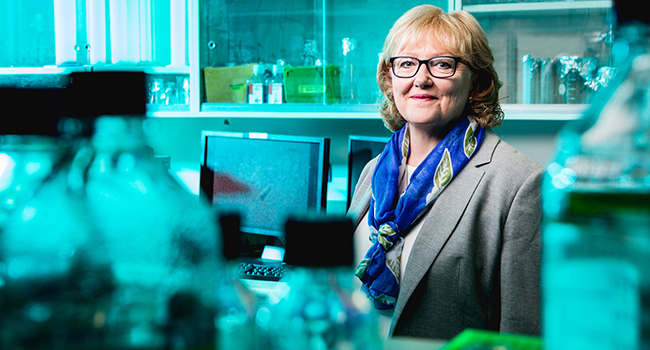University of Alberta-made tools built to study ABO blood group issues in organ transplant patients have been brought into the COVID-19 fight to determine why people with different blood types react differently to COVID-19.
“The tools allow us to look at these pieces of the ABO-COVID-19 connection,” said Lori West, Canada Research Chair in Cardiac Transplantation and pediatric cardiologist in the Faculty of Medicine & Dentistry. “And although we’ve also sought for different reasons to study ABO issues in organ transplant patients, we find ourselves as the only group in the world that has these tools because we made them.”
To further enhance this equipment and cover the urgent need for equipment for ongoing research related to COVID-19, West was one of six investigators from the U of A to share in $2.8 million in funding from the Canada Foundation for Innovation (CFI) Exceptional Opportunities Fund.
The tools are at the heart of promising research into reports that ABO blood type has an impact on the susceptibility and severity of COVID-19 and perhaps other viral diseases. Specifically, those with blood group O have fewer infections and possibly less severe illness than individuals of other blood groups, whereas those with blood group A have greater susceptibility.
One of the tools was created with the help of GlycoNet director Todd Lowary and U of A chemistry professor John Klassen, who, like West, are also GlycoNet researchers. The tool is a test that hunts for ABO antibodies in blood samples using tiny coloured plastic beads fashioned with the various blood group sugars.
A dose of COVID-19 reality by Pat Murphy
West said the new equipment from this award will dramatically increase the team’s ability to test blood samples from COVID-19 “hotspots” for ABO antibodies. The team has also devised a unique antibody panel that allows the research team to determine what blood group sugars, also known as glycans, are found in lung cells.
“It is well known that glycans have many roles in infection, but we are trying to figure out what are the roles of these specific blood group sugars in COVID-19,” said West, who is also director of the Alberta Transplant Institute and scientific director of the CIHR-funded Canadian Donation and Transplantation Research Program.
West said early analysis already reveals that different blood group sugars are expressed on lung cells where receptors bind to the COVID-19 virus. That may increase susceptibility to infection in blood group A people. Additional preliminary results from blood samples sent from the hardest-hit areas in the U.S. suggest that blood group O people who contract COVID-19 may have lower levels of potentially protective “natural” anti-A antibodies than healthy blood group O people.
“There are still many people with blood group O who get infected, and lots of A people who don’t get infected,” she noted. “This new knowledge regarding the blood group sugars and antibodies – it’s only one small step to putting the many puzzle pieces together, but it’s helpful new knowledge.”
West said with the help of Russ Greiner, U of A computing science professor, together with the Alberta Machine Intelligence Institute, the project will also capitalize on the abilities of machine learning and predictive modelling to analyze the huge quantities of new data generated with these new tools.
She added that understanding exactly what the mechanisms are that result in some protection of people with O type blood and some susceptibility of type A people could help turn the tables on COVID-19.
“These further insights could lead to practical impact on preventive and therapeutic approaches for the pandemic,” said West.
She explained this research could change everything from how we develop more effective isolation and quarantine strategies to the creation of convalescent plasma that features boosted levels of anti-A antibodies or glycan-directed vaccines that are more potent. Even the development of molecules to block those sugars is a very real possibility.
“We are getting intense interest from around the world because they know that this technology is only available at University of Alberta.”
U of A funded projects
| By Michael Brown
This article was submitted by the University of Alberta’s online publication Folio, a Troy Media content provider partner.
The views, opinions and positions expressed by columnists and contributors are the author’s alone. They do not inherently or expressly reflect the views, opinions and/or positions of our publication.







